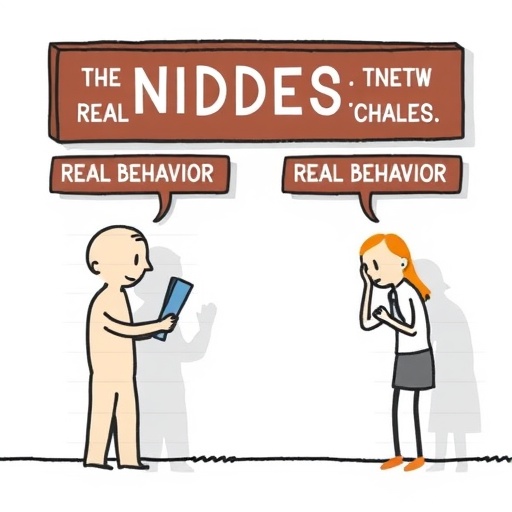In an era where behavioral science increasingly informs public policy and marketing strategies, the reliability of hypothetical scenarios as predictors of actual behavior has become a pressing question. A groundbreaking study published in Communications Psychology delves into the efficacy of so-called “hypothetical nudges,” revealing that while these prompts can directionally indicate behavior change, their predictive power remains noisy and imprecise. The research sheds new light on the complexities of human decision-making, cautioning against an overreliance on hypothetical data when designing interventions aimed at fostering real-world change.
At the core of this inquiry lies the concept of “nudging,” a behavioral economics principle that leverages subtle cues to steer individuals toward desired behaviors without restricting choice. Traditionally, nudging experiments involve actual changes in the environment or incentives, but practical constraints often necessitate the use of hypothetical nudges—scenarios that ask participants to imagine how they would act if a certain nudge were applied. The study authored by Gandhi, Kiyawat, Camerer, and colleagues systematically examines how well these imagined responses forecast genuine behavioral shifts.
The researchers employed a series of carefully controlled experiments that juxtaposed participants’ responses to hypothetical nudges against their real-world behavior under comparable nudging conditions. By manipulating factors such as default options, social comparisons, and framing effects, the team was able to precisely measure discrepancies in behavioral outcomes. Their methodology represents a sophisticated attempt to quantify the “directional consistency” of hypothetical nudges—whether the imagined responses align in direction, magnitude, and variance with actual behavior modifications.
One of the study’s critical revelations is that while hypothetical nudges do tend to point in the right direction, suggesting whether a behavior will increase or decrease, the magnitude of change they predict is highly variable. This “noise” undermines the practical utility of hypothetical estimates for fine-tuning policy interventions or marketing campaigns, especially in contexts where precise calibration of behavior change is imperative. This distinction between directional accuracy and quantitative precision is pivotal, emphasizing that hypothetical nudges are better treated as qualitative indicators rather than exact forecasts.
The implications of these findings ripple across domains reliant on behavioral insights. In public health, for example, campaigns often deploy nudges—such as opt-out organ donor registration or calorie labeling—to encourage healthier actions. Policymakers frequently rely on hypothetical surveys to gauge potential efficacy before launching costly interventions. The new evidence suggests that while such surveys offer valuable directional signals, they should be complemented with real-world trials to capture the complexity and variability inherent in human behavior.
Delving deeper into the psychology underpinning these discrepancies, the authors identify cognitive biases and context-dependent factors as central contributors to the noise in hypothetical responses. Imagining one’s behavior in a hypothetical scenario lacks the emotional and environmental cues present in reality, introducing a layer of abstraction that distorts true preferences and actions. This insight resonates with broader literature highlighting the limits of introspection and forecasting in human decision-making—an issue colloquially known as the “planning fallacy.”
Furthermore, the study methodically explores the differential impact of nudge types on the predictive fidelity of hypothetical responses. Defaults and automatic enrollment nudges, which simplify choices, yielded slightly more reliable hypothetical estimates compared to nudges relying on social norm information or monetary framing. This nuanced finding suggests that the cognitive load and familiarity associated with certain nudge types influence how accurately people can forecast their own behavior.
The authors advocate for an integrative modeling approach that combines hypothetical responses with observed behavioral data to enhance predictive accuracy. Such hybrid frameworks could leverage the scalability and cost-effectiveness of hypothetical surveys while correcting for their inherent noise via calibration against smaller real-world datasets. This proposal aligns with emerging trends in computational behavioral science emphasizing robust, data-driven models that respect human variability.
Crucially, the study also touches on ethical considerations surrounding nudging and the interpretation of hypothetical data. Overconfidence in hypothetical estimates risks deploying ineffective or counterproductive interventions, potentially eroding public trust in behavioral science initiatives. Transparent communication about the probabilistic and uncertain nature of hypothetical nudges is therefore essential for responsible policy design.
Reflecting on the societal ramifications, this research calls for a tempered optimism regarding the power of behavioral science to enact change purely through verbal or hypothetical commitments. The gap between intention and action remains a formidable barrier, complexly woven by social, psychological, and environmental threads. Recognizing this chasm underscores the importance of longitudinal, real-world testing alongside initial hypothetical assessments.
The study’s robust analytical framework sets a new benchmark for the evaluation of behavioral interventions. By clearly delineating the limits of hypothetical nudges, Gandhi and colleagues equip researchers and practitioners with a more realistic toolkit for predicting human behavior—a toolkit that balances hope with humility.
In conclusion, while hypothetical nudges offer a convenient and scalable means to glean preliminary insights into behavior, their noisiness mandates caution and supplementary validation. The quest to influence behavior at scale requires not only clever design but also rigorous empirical vetting. This pioneering work opens pathways for future research to refine predictive models and to develop more sophisticated nudging strategies that account for the inherent unpredictability of human choice.
As behavioral science continues to expand its influence across disciplines, this nuanced understanding of the strengths and limitations of hypothetical nudges will prove invaluable. It invites a recalibration of expectations and methodologies, fostering more effective, ethical, and evidence-based applications of behavioral interventions worldwide.
Subject of Research: The predictive accuracy of hypothetical nudges in estimating real-world behavior change.
Article Title: Hypothetical nudges provide directional but noisy estimates of real behavior change.
Article References:
Gandhi, L., Kiyawat, A., Camerer, C. et al. Hypothetical nudges provide directional but noisy estimates of real behavior change. Communications Psychology 3, 158 (2025). https://doi.org/10.1038/s44271-025-00339-x
Image Credits: AI Generated




